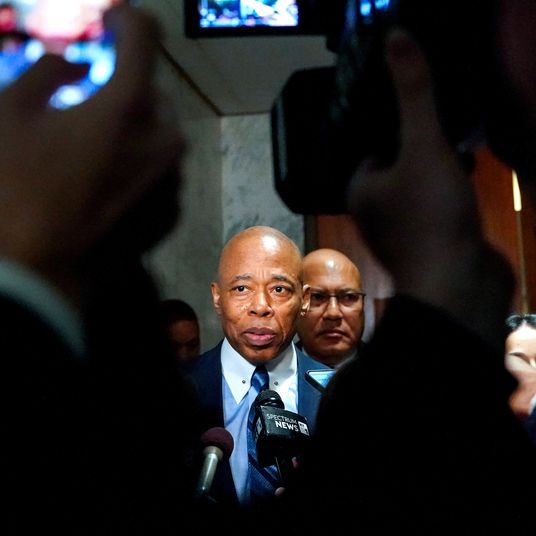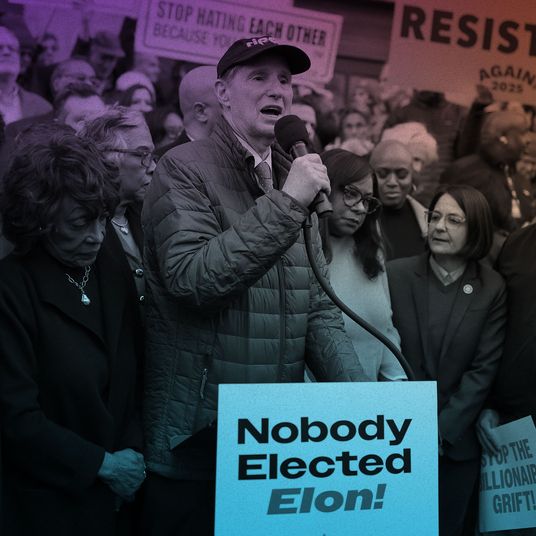The repercussions of the forthcoming end to Roe v. Wade are only beginning to come into view. One of those may be to force an end to the Senate filibuster. It could also put an end to the Republican Party’s internal hierarchy that has always enabled the money wing to get what it wants, while the social conservatives have to wait their turn.
When Republicans gain control of government, they use their power to deliver victories for their economic constituents. This has held true for decades and has not changed. Even after Donald Trump’s supposedly populist takeover, the party’s priorities in 2017 and 2018 revolved around a tax cut for business owners and heirs to large estates, and an attempt to scale back health-care coverage for people with low incomes or preexisting conditions. The agenda was hardly any different than it would have been if Paul Ryan were president.
Social conservatives don’t generally get legislation. They get judges. One reason for this is that Senate rules force social legislation to get 60 votes to pass but allows fiscal legislation to pass with a majority. These rules mean that, unless they can win a supermajority, the Republican social agenda is automatically dead on arrival, and the party’s money wing has priority by default.
Mitch McConnell swears up and down that he will preserve what is left of the filibuster, even if his party regains power, and even if it prevents him from passing a national abortion ban. “I will never — never — support smashing the legislative filibuster on this issue or any other,” he promised on Monday.
Many Democratic critics of the filibuster say McConnell is lying. “When the opportunity presents itself, there’s no doubt in my mind that they’ll change the rules to pass a bill criminalizing abortion federally,” says Senator Chris Murphy.
I actually believe McConnell — or, at least, I believe this is what he wants. The widespread belief that he will turn around and end the filibuster is a failure to think clearly about McConnell’s own priorities.
The Senate’s current rules are tailored almost perfectly to McConnell’s needs. (This is no coincidence, since McConnell had a big hand in shaping these rules.) First, the things McConnell most wants to pass can pass with 50 votes: tax cuts and spending cuts, both of which can pass through budget reconciliation rules, and confirming judges.
Second, the rules make it easy to block the things McConnell most wants to block: New regulations, such as pollution or campaign finance, and the enactment of most new social programs all require 60 votes. Obamacare took 60 votes to pass and would have been destroyed with 50 (though Republicans only mustered 49).
Third, the remaining filibuster also prevents Republicans from passing radical measures McConnell would, for the most part, prefer not to pass. A national abortion ban is the ultimate example of something Republicans want to be stopped from passing.
The party’s reluctance to pass a national abortion ban has been glaringly evident from the moment news broke that the Supreme Court is poised to overturn Roe. The Republican obsession first with the mechanics of the leak, and then with the protests against the ruling, represent nothing so much as fanatic message discipline in service of a shared goal of keeping an abortion ban off the table.
Axios reports that, according to internal Republican polling, “voters aren’t ‘hip to this kind of seismic change,’” but “activist candidates and voters couldn’t care less what the Establishment wants — and see this as the moment to fulfill their lifelong dream of strict abortion bans, with few exceptions, and penalties for those carrying out abortions.”
In the past, Republican leaders have been able to use the filibuster to put off social conservatives. The social conservatives could get friendly judges confirmed, but the filibuster meant they couldn’t get laws passed. Now that Roe v. Wade is about to disappear, the opportunity will be there to pass a national abortion ban the next time Republicans gain control of government.
McConnell isn’t going to want to do that. McConnell, like most of his party’s leadership, cares deeply about protecting the economic interests of the affluent. He is even willing to expose his members to unpopular votes in order to advance that cause. He does not want to expose them to unpopular votes on behalf of the social conservative agenda.
Social conservatives have been compliant for a remarkably long time with an internal Republican ordering system that largely reduces them to foot soldiers used to deliver tax cuts for the rich while the culture grows steadily more liberal.
Now the judges the social conservatives got for their patience are finally about to deliver the big prize. The Court is prepared to strike down the right to abortion, and the next Republican-controlled government will have the constitutional ability to ban a procedure they deem to be murder and that will otherwise remain legal in vast swaths of the country.
The one thing that might stand in their way, presuming they don’t control 60 votes, will be the filibuster. McConnell is going to want to preserve it. The question is whether they will go along.





























